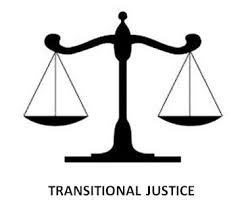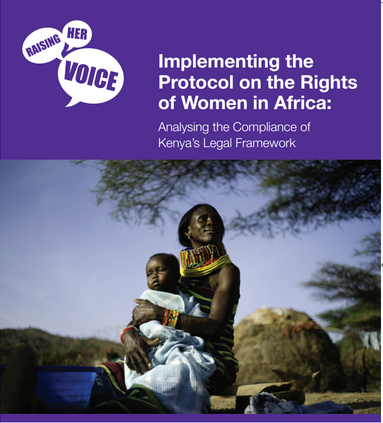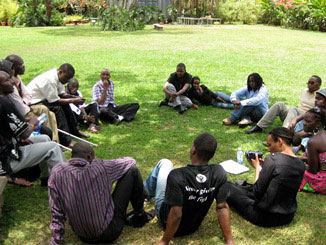The Transitional Justice Tafakari Forum
Date: 6 October 2014 Time: 0900Hrs
Venue: Kampala
Theme: Towards a self sustaining Transitional Justice in Africa
Twitter #TransitionInAfrica and on live streaming at http://www.ustream.tv/broadcaster/19024495
Fahamu in its efforts to create spaces for dialogue and debate to amplify Africa-centred voices, perspectives and solutions has partnered with Refugee Law Project, a Uganda based organisation to organise a dialogical space for conversation and reflection on the complexities of the current transitional justice policies and processes in addressing the concerns of post-conflict societies in Africa.
The forum brings together representatives from the Civil Society, legal scholars/practitioners, researchers, anthropologists, economists, sociologists and activists working with communities that have been victims of collective violence from Burundi, Read More
Oxfam, Fahamu and the State of the Union Coalition (SOTU) have pleasure in inviting you to a breakfast celebrating the launch of the first country report under Oxfam’s Raising Her Voice project analysing the implementation in Kenya of the Protocol on the Rights of Women in Africa.
Please save the date in your diary. Further information will follow shortly. Please contact Moreen Majiwa e-mail: [email protected] Tel: 0700932170 with any queries in the meantime. The event will be held on 30 September 2014 Villa at Rosa Kempinski, Chiromo Rd. Nairobi, Kenya from 8.00am to 11.30am.
The Community Immersion and Dialogue in Mwea Irrigation Scheme was the 2nd in a series of Monthly dialogues conducted under Fahamu’s Pan African Fellowship Programme(FPAP).The session took place from 26th -29th August 2014.
During the Immersion, fellows were able to gain in-depth understanding on the struggles by rice farmers in Mwea in their quest for food sovereignty.The experience sharing sessions on gains in their struggle was an eye opener for the fellows.
See more photos on our Facebook Page
(function(d, s, id) { var js, fjs = d.getElementsByTagName(s)[0]; if (d.getElementById(id)) return; js = d.createElement(s); js.id = id; js.src = "//connect.facebook.net/en_US/all.js#xfbml=1"; fjs.parentNode.insertBefore(js, fjs); }(document, 'script', 'facebook-jssdk'));
 This is part of a speech and a collection of pictures including pictures taken during the launch of Black History month at the United States International University in Kenya, where the speech was given. The speech was made by Prof. PLO Lumumba an associate Professor of Public Law.
This is part of a speech and a collection of pictures including pictures taken during the launch of Black History month at the United States International University in Kenya, where the speech was given. The speech was made by Prof. PLO Lumumba an associate Professor of Public Law.
He has lectured law at the University of Nairobi, the United States International University (Africa), Widener University USA (Summer School).
Fahamu took the opportunity during this launch to disseminate a 2013 report on Kenya’s compliance with African Union (AU) legal instruments, policy standards and decisions under the State of the Union (SOTU) Read More
 Evelyn Mkite is a fellow based in Cheptais location in the Mt Elgon region in Bungoma County. Her activism work revolves around fighting against child labour in Cheptais with the intent of keeping children in school.In the Mt Elgon region there has been an upsurge of school dropping-out over the last couple of years.
Evelyn Mkite is a fellow based in Cheptais location in the Mt Elgon region in Bungoma County. Her activism work revolves around fighting against child labour in Cheptais with the intent of keeping children in school.In the Mt Elgon region there has been an upsurge of school dropping-out over the last couple of years.
This is as a result of a number contributing cocktail of factors such as the re-introduction of the ‘Shamba System’, armed conflict in the recent history of the region, poverty and cultural practices.
The Plantation Establishment for Livelihood Improvement Scheme (PELIS), better Read More
 During the May workshop the fellows were ask to reflect over their fellowship experience. To this effect the fellows were asked questions regarding the meaning of the fellowship program, what their expectations are, what they are willing to commit to and what needs to improve to make the…
During the May workshop the fellows were ask to reflect over their fellowship experience. To this effect the fellows were asked questions regarding the meaning of the fellowship program, what their expectations are, what they are willing to commit to and what needs to improve to make the…
fellowship program more efficient. The purpose of this exercise was to re-establish the purpose of the fellowship while reiterating the specific objectives it is meant to achieve and how the fellows’ activism is able to fit within the set objectives.
It is important to emphasize that while there are set Read More
 In the month of May Kiama Kaara introduced discourse on the concept of the commons. From this interaction the fellows were able to learn that Social Justice advocates for the Common goods of life. The fellows also appreciated the fact that the commons of the world are being unjustly held in the hands of a few at the expense of the many.
In the month of May Kiama Kaara introduced discourse on the concept of the commons. From this interaction the fellows were able to learn that Social Justice advocates for the Common goods of life. The fellows also appreciated the fact that the commons of the world are being unjustly held in the hands of a few at the expense of the many.
Such is the case as exhibited by issues to do with water and housing for instance. Activists and social movements are the agents that challenge the power relations when it comes to access, equity and equality Read More
 An interaction with John Njehia, a fellow with the FPAF, will immediately reveal his keen sense of purpose in the work he does – advocacy for the urban poor in the ensuring of security of land tenure and proper housing. His area of focus is largely in Nairobi’s Mathare ‘informal settlement’ schemes. John is an active member of the Muungano Wa Wanavijiji, Federation of Slum Dwellers, movement.
An interaction with John Njehia, a fellow with the FPAF, will immediately reveal his keen sense of purpose in the work he does – advocacy for the urban poor in the ensuring of security of land tenure and proper housing. His area of focus is largely in Nairobi’s Mathare ‘informal settlement’ schemes. John is an active member of the Muungano Wa Wanavijiji, Federation of Slum Dwellers, movement.
During a visit with John several weeks ago, we had the privilege of better appreciating the movement’s struggles and efforts in pursuing the needs of the urban poor in Mathare. Read More
 Can Pigs Talk? This was the question posed to the Fellows by Dr Steve Ouma during the May workshop.
Can Pigs Talk? This was the question posed to the Fellows by Dr Steve Ouma during the May workshop.
This was rather interesting considering that one of the fellows, Emily Kwamboka, had been part of the protest match that took their grievances to the very doors of parliament.
Emily has been a long time member of the Bunge La Mwananchi, The People’s Parliament. This is a movement that seeks to increase public participation and awareness of issues in the society. This movement was instrumental in the mobilization of the Kenyans that took part in the picketing excercise.
The Fellows Read More

The Adilisha program will be holding a movement building boot camp for activists’ from social justice movements and organisations in Lesotho, Namibia, Zambia, Zimbabwe and Malawi.The boot camp being held in Lusaka, Zambia from May 12 to 17 will facilitate activists’ consciousness of their context from a deep analysis and connect what they are doing to the bigger picture or vision of social change they seek to achieve.
Participants will critically analyse their organising strategies and tactics to develop alternative strategies for effective and creative organising.It is also expected that the participants will derive approaches for educating political education Read More








